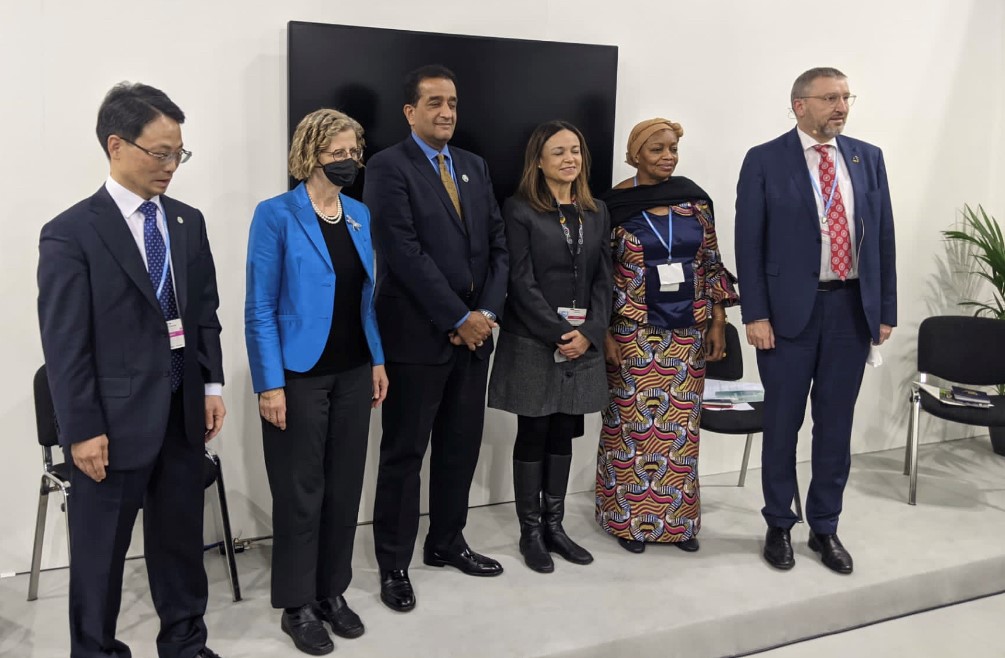At UN-REDD's COP26 event, ministers show how we can break old habits and make forest action happen at scale
Paying for products and services is often an automatic gesture. But being asked to pay for something which you don’t necessarily see, that does not bring you a tangible, immediate benefit can make you reluctant to reach for your pocket. Governments and the private sector have long been wary about investing in the services that nature and forests provide. But, as we face the increasingly severe impacts of the climate crisis and the ongoing COVID-19 pandemic, nations and businesses are increasingly looking to Nature-based Solutions, and to forests in particular, as the most mature of these solutions.
At COP26 in Glasgow, the Financing Forest Action: Investing in Forests to Address the Climate Crisis side event organised by UN-REDD brought together environment ministers from Pakistan, the Democratic Republic of Congo (DRC) and Costa Rica, as well as Inger Andersen, UNEP Executive Director, André Weidenhaupt, Director General for Luxembourg’s Ministry of the Environment, Climate and Sustainable Development, Dr. Eunsik Park, Secretary General of the XV World Forestry Congress (WFC) and the DG of International Affairs Bureau of the Korea Forest Service and included a video intervention from Dr. Partha Dasgupta, Professor Emeritus of Economics at the University of Cambridge. Mario Boccucci, head of the UN-REDD Secretariat, opened the session by stressing that the world needs to move from an era of negotiation into a decade of scaled-up actions for forests. The discussion, moderated by Mirey Atallah, deputy director of the UNEP Ecosystems Division, focused on how countries in different regions approach investments in forests conservation and restoration and how the global community needs to rethink the value of forests in order to provide the much-needed emission reductions of at least 1Gt/year by 2025.
Forests host people from cradle to grave, securing livelihoods, health, food, and culture, said Eve Bazaiba, Deputy Prime Minister and environment minister for the DRC, who stressed the importance of the forest-rich Congo Basin for keeping global temperatures below 1.5°C. She pointed out the need to find a balance between economic development and forest protection and to provide structural investments to enable local communities and Indigenous Peoples who live in forested areas to protect them.
With an estimated climate mitigation and adaptation cost of $40 bn for mitigation and adaptation, the DRC is a country abounding in resources and solutions, said Deputy Prime Minister Bazaiba, which needs investments at scale to support local transformation in a way that solves development challenges and allows for a low-carbon transition.
Pakistan’s investments in forests, said Malik Amin Aslam, the country’s Minister for Climate Change, gained momentum from 2014 with the Billion Tree Tsunami project, based on a vision to afforest the Asian nation. Minister Aslam highlighted the important role that governments have in catalysing finance for forests, as tapping into public funding can incentivise private finance to follow. The Billion Tree project received governmental funding and allowed the state to learn what was critical in forest investments: zero tolerance for tree cutting, total transparency, involving local communities in forest protection and making them owners of forest protection actions, and having a flexible plan.
Pakistan is also focused on creating innovative finance tools which can serve as examples for financing forest action, the minister explained. The country is using a green bond linked to forestry, is testing a blue bond for mangrove conservation, and is looking at a nature-performance bond, also tied to forests.
On the other side of the world, Costa Rica started recognising the role of nature more than two decades ago, said Andrea Meza, its Environment and Energy Minister. The Central American country acknowledged that it needed to value the ecosystem services that forests provided and developed a forestry fund through which it paid local communities for protecting and sustainably managing forests. Through the years, about 75% of the contracts for ecosystem services payments have gone to small and medium-size households, providing vital income to about 30,000 families; in turn, local communities often reinvest the money into securing other essential services such as access to clean water, according to Minister Meza.
Costa Rica’s enduring commitment to nature protection and its solid measurement, reporting and verification (MRV) systems have also allowed it to build an inventory of the country’s forest cover and increasingly access results-based payments via international bodies. In 2020, Costa Rica mobilised over $50 million USD from the Green Climate Fund, and another $50 million USD from the World Bank’s Forest Carbon Partnership Facility, which they invested in forest actions. Minister Meza stressed that international funding was critical at a time when national forest funding was suffering because of the COVID-19 pandemic.
Minister Meza wrapped up her intervention by reminding the audience that forests can no longer be seen as the cheap solution for the climate crisis. Climate finance is still under-pricing the services that forests provide and it needs to put a higher value on the carbon that forests offset, not just through trees, but also through water regulation and biodiversity, the minister said.
Inger Andersen, UNEP Executive Director, saluted the forest pledges made through the Glasgow Leaders’ Declaration on Forests and Land Use, but stressed that is not the first time the world has made such promises, and that promises do not mean the end of the journey is near. As Ms. Andersen put it, the proof of the pudding is in the eating. Delivering the finance to the communities who rely on and protect forests needs to be at the forefront of governments’ focus, with the Green Gigaton Challenge, the UN Decade for Ecosystems Restoration and UN-REDD helping to maintain focus on the ultimate goal of enabling emissions reductions from the forest sector at a rate 5 GtCO2e/year by 2030.
The next milestone on this journey is already on the horizon with the World Forestry Congress (WFC) in May 2022. Dr. Eunsik Park closed the session by acknowledging that a key focus of the Congress will be to significantly contribute to progress on forest finance. According to Dr. Park, the Congress will be a key moment to continue the conversation on funding forest action, while the WFC will provide an excellent platform to boost ambitions for forests.




